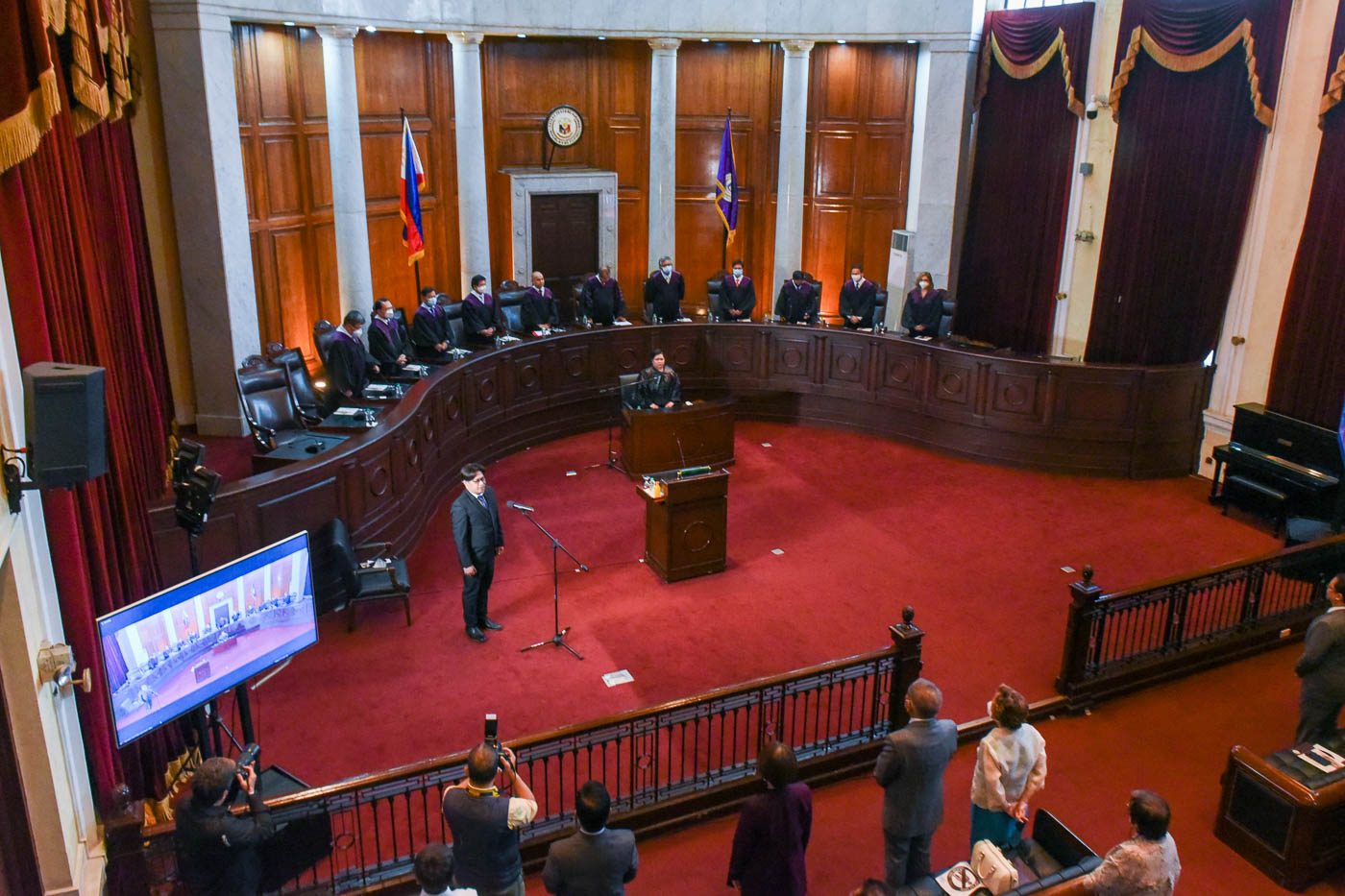SUMMARY
This is AI generated summarization, which may have errors. For context, always refer to the full article.

MANILA, Philippines – Instead of imprisonment, a person found guilty of cyber libel can be fined, the Supreme Court reiterated.
In a ruling penned by Associate Justice Antonio Kho Jr., the High Court’s en banc denied the petition for certiorari – a petition seeking a review of a lower court’s decision – filed to assail a Court of Appeals (CA) decision on a cyber libel case.
The petition claimed that the CA committed grave abuse of discretion when it upheld a Regional Trial Court (RTC) decision convicting a person for cyber libel, and sentencing him to pay a fine of P50,000.
The case in challenge was the conviction of a certain Jomerito Soliman.
What happened before
It all started with a Facebook post.
- In 2018, Soliman was sued for cyber libel under section 4(4) of Republic Act No. 10175 or the Cybercrime Prevention Act of 2012 over his Facebook post against then-agriculture assistant secretary Waldo Carpio.
- Soliman claimed in his social media post that Carpio allegedly “took favors and unduly delayed the release of Soliman’s Sanitary and Phytosanitary Import Clearance.”
- Shortly, the lower court found Soliman guilty of cyber libel and sentenced him to pay a fine of P50,000. The accused paid the said fine and no longer appealed his conviction.
- What pushed the RTC to make the decision is the High Court’s Administrative Circular (AC) No. 08-2008 or the Guidelines in the Observance of a Rule of Preference in the Imposition of Penalties in Libel Cases. Under the said rules, courts can impose fines instead of imprisonment penalties in libel cases.
- However, the Office of the Solicitor General (OSG), the government’s primary legal counsel, filed a petition for certiorari with the CA, challenging the RTC’s decision. The OSG claimed the RTC committed grave abuse of discretion when it imposed only a fine for Soliman’s libel conviction.
- But the appellate court sided with the RTC and denied the OSG’s petition, prompting the latter to bring the case to the court of last resort.
The ruling
Agreeing both with the RTC and the CA, the SC clarified the existing punishments for libel.
- According to the SC, the Revised Penal Code (RPC), which contains general penal laws in the Philippines, recognized that a fine may be imposed as a single or alternative penalty for libel. This is evident in the RPC’s “plain use of the disjunctive word ‘or’ between the term of imprisonment and fine, such word signaling disassociation or independence between the two words.”
- Under the RPC, the penalty for traditional libel is “prision correcional in its minimum and medium periods or a fine ranging from PhP40,000 to PhP1,200,000, or both.” The SC put an emphasis on the conjunction “or” in the said law.
- “As for online libel, the Court found that the People erroneously assumed that only imprisonment may be increased or decreased by degrees under the RPC, and that thus, imprisonment is the mandatory penalty for online libel,” the High Court explained.
- In applying AC No. 08-2008 or the SC’s rules on libel, the High Court explained that the guidelines “[do] not supplant the legislative intent behind the imposition of a higher degree of penalty in online libel. In fact, with due deference to prevailing statutes, it is careful to emphasize that it does not remove imprisonment as an alternative penalty.”
- The SC said it found that the circumstances surrounding the accused’s libelous post is similar to the one of the circumstances present in the guidelines. This was the fact that the accused was “animated” by his anger and perception that the former official “was provoking him by his allegedly intentional delay in releasing Soliman’s clearance.”
What’s the SC rule on libel all about?
The 15-year-old SC guidelines were signed by then-SC chief justice Reynato Puno on January 25, 2008.
- In explaining the rules, the High Court cited four cases where courts decided to impose only a fine on a person, rather than imprisonment in cyber libel cases. These are: Fernando Sazon v. Court of Appeals and People of the Philippines, Quirico Mari v. Court of Appeals and People of the Philippines, Roberto Brillante v. Court of Appeals and People of the Philippines, and Jose Alemania Buatis, Jr. v. People of the Philippines and Atty. Jose Pieraz.
- The SC said these four cases “indicate an emergent rule of preference for the imposition of fine only rather than imprisonment in libel cases under the circumstances therein specified.”
- The guidelines added that judges should take into consideration the peculiar circumstances present in the four cases. And by doing that, they should determine whether imposing a fine would best serve the interests of justice or if the lack of imprisonment “would depreciate the seriousness of the offense, work violence on the social order, or otherwise be contrary to the imperative of justice.”
– Rappler.com
Add a comment
How does this make you feel?







There are no comments yet. Add your comment to start the conversation.